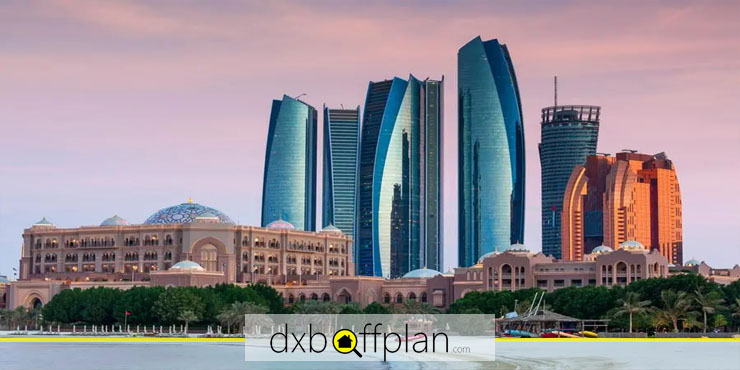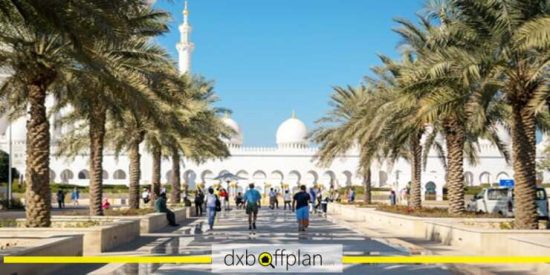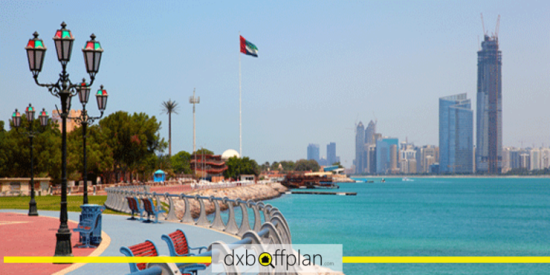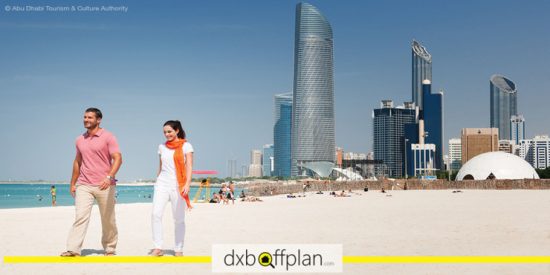Pros and Cons of Living in Abu Dhabi
When we hear the name of Abu Dhabi in the news, it is often the sophisticated elegant way of life and ever so booming economy that gets all the attention. However, like all the other big cities in the world, there are a couple of downsides to deal with here as well. This town has always been the subject of comparison with Dubai and most often Sharjah, but how does it really differ from them in terms of living conditions and expenses?
Here, in this article by Dxboffplan, we have explored many aspects of living in this town, presenting to you a balanced perspective of pros and cons of living in Abu Dhabi. Whether you intend to move to this cosmopolitan city for job opportunities, taxation benefits, or high-quality lifestyles, it is essential to give these points serious attention in order to make a prudent decision. Let’s dive in!
Benefits of Residing in Abu Dhabi
Living in Abu Dhabi, the capital of the United Arab Emirates, can be a truly unforgettable experience with plenty of possibilities. The city glitters with its modern infrastructure as well as a cosmopolitan vibe, which presents a number of benefits to its locals:
- Luxury real estate choices: It is next to impossible not to have world-class and impeccable real estate buildings in Abu Dhabi. If one can afford it, any kind of realty they desire can be acquired.
- Safety: immigrants can live freely here since there’s no crime happening.
- Booming Economy: ample career opportunities, ideal place for career growth and business development.
- Tax Exemption: there is no income tax to worry about. This feature is especially attractive as no part of your revenues goes towards paying taxes.
- High Standard of Living: Although Abu Dhabi’s healthcare services could in some manner differ from that which you have been used to, its high standard of living makes it a comfortable city to reside in for singles as well as families. These excellent services include world-class facilities as well as education.
- Cultural diversity: Abu Dhabi has a cosmopolitan society with a naturally welcoming atmosphere.
- Language and Communication: official language here is Arabic but most can also speak English.
- Tourist Destinations: You’ll find plenty of Hidden Gems of Abu Dhabi to visit like museums, parks, malls and beaches here.
Now that you know about the advantages of making your life wonderful, let’s discuss some of the negative points of living in Abu Dhabi as well.
Disadvantages of Living in Abu Dhabi
Despite many positives advantages, there are also a few negatives to living in Abu Dhabi that can impact your life:
- High Cost of Living: From rentals to day-to-day spending, living in this city can cost a lot. Property prices in Abu Dhabi can also be a challenge.
- Very Hot Climate: Summer season is very hot with low humidity, which can cause discomfort.
- Social and Cultural Restrictions: they include dress code as well as public behavior regulations.
- Traffic and transport: another possible negative aspect of residing in Abu Dhabi can be traffic and transport. While there exists a public transport network, traffic congestion along with parking can sometimes get infuriating.
- Stringent Legal laws: Abu Dhabi’s strict regulations can be intimidating to those used to more open climates. They consist of social as well as personal matters.
- Restricted Access to Medical Care: Expatriates have a rather limited access to medical care, and medical care can be very costly here.
These negatives, as with any positives, should be weighed up carefully before deciding to live in Abu Dhabi. There are plenty of chances in the city, but everything needs to be weighed up and the decision needs to be made in terms of individual circumstances and priorities.
Living Conditions in Abu Dhabi
Abu Dhabi experiences contrasting living conditions. Being an economically thriving city, it is a place of desirable migration. Its desert, hot climate is also balanced by cool, pleasant winters, which is the most desirable time to visit. High security, a flourishing economy, coupled with its tax-free ambience, make it some of its strengths, while Abu Dhabi living costs as well as cultural inhibitions can, otherwise, represent its drawbacks. Here is a closer look:
Abu Dhabi’s Employment Market
Abu Dhabi’s job market continues to get bigger, primarily in the classic and main sectors of oil and gas. There are also always demands I’m finance, real estate, health, and education. The reported high numbers are indicative of the city’s capability to provide competitive remuneration packages and benefits, with Abu Dhabi being a destination of choice for best talent from across the globe. The job market is however reasonably competitive, with most occupations requiring the candidate to possess the required qualifications, networking skills, and experience.
Cost of Living in Abu Dhabi
Living in Abu Dhabi can prove to be pricey, particularly for newly arrived expats in the city. The single greatest expense is rent—one-bedroom apartments in downtown areas cost from AED 5,000 to AED 8,000 a month, or villas in expat developments like Khalifa City or Saadiyat Island can cost up to AED 15,000. The utilities (water, electricity, air conditioning) cost from AED 400 to AED 700 a month for standard usage. The public transport network is low-cost, yet owning a car involves insurance charges and parking fees. Foreign retail chains like Carrefour or Waitrose food costs from AED 300–400 a week for a person, eating out from as little as AED 25 for casual food to more than AED 300 for a meal in a high-end restaurant. Some companies have housing and school allowances, which can reduce a considerable sum from total costs for expats.
School Condition and Cost in Abu Dhabi
Abu Dhabi offers a wide variety of private schools running international curricula to serve its large expat population. Fees varied widely in schools, with top schools paying between AED 45,000 to AED 70,000 a year, mid-range schools charging from AED 20,000 to AED 40,000 a year. Places can be hard to get, with early registration necessary. School facilities are excellent, with laboratories, play pitches, and performing arts facilities.
Higher Education in Abu Dhabi
Higher education exists through NYU Abu Dhabi, as well as Khalifa University, etc. Abu Dhabi’s education system overall is excellent but very pricey, with parents having to think hard in terms of curricula, areas, as well as extra charges, before making a choice.
Abu Dhabi or Dubai? Which One Is Better?
While Abu Dhabi and Dubai each hold a major place in the UAE, they live very different lives. The more conservative, family, and slower-moving capital, Abu Dhabi, is more traditional. It contains more affordable residential areas, less traffic, as well as more government positions. The Louvre Abu Dhabi as well as Qasr Al Watan Palace show its focus on heritage as well as diplomacy. Dubai, on the other hand, is more commercially oriented, urban, as well as entrepreneurial. It contains more nightlife, international festivals, as well as more of an expat community. Real estate in Abu Dhabi, in most cases, is less expensive to long-term dwellers, while more variety in property law as well as short-term renting can be found in Dubai. Both are high in terms of living expenses however. Abu Dhabi in total is for professionals as well as families who like things their traditional way, while Dubai is for urban dwellers.
Is Moving to Abu Dhabi Right for you?
Abu Dhabi is great for anyone looking to work in the oil and gas, health, education, engineering or financing. The emirate has a strong job environment and a tax-free policy which naturally grabs the attention of expatriates looking to save or invest.
Families looking for quality education as well as a secure place to live also find Abu Dhabi appealing due to international schools, low crime, as well as modern residential areas.
Entrepreneurs in UAE, along with company owners, are given supportive free zones, open regulation practices, as well as access to regional markets.
Abu Dhabi is perhaps less suited for professionals with little or no opportunity in free market careers. This is also true for retirees living off fixed incomes, as living costs in Abu Dhabi might be high. People who appreciate liberal ways of living might find cultural restraints in drinking, dress code, as well as public conduct difficult to adjust to. People who thrive in organized, multicultural professional atmospheres along with an adjustment to hot climates, as well as regulation-based systems, shall find Abu Dhabi a secure, as well as a satisfying place.
Last Words
The pros and cons of living in Abu Dhabi are easy to count. On the pro side, high security, plenty of job prospects, tax-free living, and high standard of living make Abu Dhabi a comfortable place to live for both locals as well as foreigners. On the other hand, high costs, hot climate, cultural as well as social constraints, as well as commuting challenges can make living in the city a challenge. Ultimately, it all comes down to a matter of personal choice as well as priorities to determine if Abu Dhabi is your cup of tea. Those with a penchant for new challenges as well as a lifestyle in a cosmopolitan, dynamic city can find Abu Dhabi to be absolutely right, while those in search of peace as well as lower costs might seek elsewhere like Sharjah or Umm Al Quwain in the UAE. Contact us at Dxboffplan today if you need a free consultation session on where to move and what lies ahead.
frequently asked questions
Living in Abu Dhabi has many advantages like high living standards and a tax free environment. There is also a whole range of tempting entertainment options to keep one busy. The city also has great infrastructure, a great healthcare and education system. Families would thrive here as it is completely safe and expat friendly.
The living cost in Abu Dhabi is rather high. The cost is particularly high when it comes to buying or renting a property and also the education. The climate should also be considered since it has incredibly warm summers that can prove difficult to adjust to. There can be traffic, as well as high costs to owning a car. Finally, since this is an Arab city, the majority are going to speak the native tongue. Although many people also are fluent in English as well.
For anyone buying or renting a property in Abu Dhabi, the cost is going to be high. But the housing cost also depends on the location and the range of amenities the place you choose. food can also be pricey, but there are less-costly options. Education, especially in international schools, can have a high price tag, though education quality is high. While some commodities and services can be more pricey than in other towns, lack of taxation in most cases can offset.











